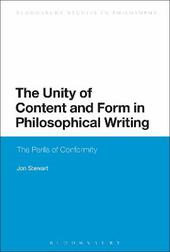
|
The Unity of Content and Form in Philosophical Writing: The Perils of Conformity
Hardback
Main Details
| Title |
The Unity of Content and Form in Philosophical Writing: The Perils of Conformity
|
| Authors and Contributors |
By (author) Professor Jon Stewart
|
| Series | Bloomsbury Studies in Philosophy |
|---|
| Physical Properties |
| Format:Hardback | | Pages:232 | | Dimensions(mm): Height 234,Width 156 |
|
| Category/Genre | Philosophy |
|---|
| ISBN/Barcode |
9781472512765
|
| Classifications | Dewey:101 |
|---|
| Audience | | Undergraduate | | Postgraduate, Research & Scholarly | |
|---|
|
Publishing Details |
| Publisher |
Bloomsbury Publishing PLC
|
| Imprint |
Bloomsbury Academic
|
| Publication Date |
18 July 2013 |
| Publication Country |
United Kingdom
|
Description
In The Unity of Content and Form in Philosophical Writing, Jon Stewart argues that there is a close relation between content and form in philosophical writing. While this might seem obvious at first glance, it is overlooked in the current climate of Anglophone academic philosophy, which, Stewart contends, accepts only a single genre as proper for philosophical expression. Stewart demonstrates the uniformity of today's philosophical writing by contrasting it with that of the past. Taking specific texts from the history of philosophy and literature as case studies, Stewart shows how the use of genres like dialogues, plays and short stories were an entirely suitable and effective means of presenting and arguing for philosophical positions given the concrete historical and cultural contexts in which they appeared. Now, Stewart argues, the prevailing intolerance means that the same texts are dismissed as unphilosophical merely due to their form, although their content is, in fact, profoundly philosophical. The book's challenge to current conventions of philosophical is provocative and timely, and will be of great interest to students and scholars of philosophy, literature and history.
Author Biography
Jon Stewart is Associate Research Professor at the Soren Kierkegaard Research Centre at Copenhagen University, Denmark. A member of the Royal Danish Academy of Sciences and Letters, he is coeditor of the Kierkegaard Studies Yearbook; editor of two series on Kierkegaard Research; and author of Kierkegaard and his Contemporaries: The Culture of Golden Age Denmark, and Idealism and Existentialism: Hegel and Nineteenth- and Twentieth-Century European Philosophy (Continuum 2010).
ReviewsJon Stewart's impressive erudition illuminates the mosaic of philosophical writing's diverse forms and styles against the backdrop of the history of philosophy and its occasional cross-pollination with literary form. From Plato to Rorty, Lessing to Borges, Seneca to Sartre, The Unity of Content and Form in Philosophical Writing directs our attention to the dialectical relationship between the content of form and the form of content. The result is at once a harsh indictment of form and style in contemporary Anglo-American philosophy and a celebration of that tradition's rich potential. Like Soren Kierkegaard's pseudonym Vigilius Haufniensis, Stewart is a watchman: his book warns of the dangers of conformity and bears witness to the abundant and varied tools of written philosophical expression, the manifold of which may just be one of philosophy's greatest truths. -- J.D. Mininger, Associate Professor of Social and Political Theory at Vytautas Magnus University, Kaunas, Lithuania Jon Stewart mobilizes the history of philosophy with its various modes of writing against external and internal limitations, caused by institutional conventions or presupposed concepts of science - pointing to and exemplifying impressively the relation between philosophy and literature, which does not affect each characteristics, but rather ensures philosophy's vitality. -- Dr. Markus Kleinert, Max Weber Center for Advanced Cultural and Social Studies, University of Erfurt, Germany
|